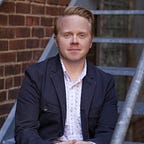Celebrating Viktor Frankl: How a Holocaust Survivor’s Philosophy on Happiness Remains Relevant Today
Acclaimed Austrian psychiatrist, Viktor Frankl, would have celebrated his 110th birthday on March 26, 2015. Though it’s been more than 15 years since his passing, his work to help humanity understand happiness continues today.
Born March 26, 1905 in Vienna, Frankl was the founder of logotherapy, a form of existential analysis and psychotherapy.
He was also a prolific author of over 39 books published in 43 languages, including his celebrated memoir, Man’s Searching for Meaning. Based partly on his time in Nazi concentration camps between 1942 and 1945, Frankl’s memoir sold more than 10 million copies worldwide at the time of his death in 1997, making it one of the best-selling books of the 20th century.
Drawing from both his personal experiences as a Holocaust survivor, and the experiences of the patients he treated years later, his work on the nature of human suffering represents an important distinction between our perception of happiness and the process of discovering happiness through meaning.
It also may offer some important solutions to the career crisis many people are facing today and the growing dissatisfaction we see in the workplace.
Work and Suffering
The hellish conditions Frankl endured at Theresienstadt, Auschwitz, and Dachau taught him an important lesson on the nature of human suffering. Though humans often view happiness and circumstance as inseparable, Frankl argued that even in the most challenging of environments, we have the power to choose our own path based on how we react.
In his memoir, Frankl wrote: “If there is a meaning in life at all, then there must be a meaning in suffering. Suffering is an ineradicable part of life, even as fate and death. Without suffering and death human life cannot be complete.”
According to Frankl, the discovery of meaning happens because of three factors: Having something to work on (a project), someone to love (a significant relationship), and a redemptive view of suffering.
Despite his environment, he remained dedicated to working on the book manuscript he had started before entering the first concentration camp. He also remained convinced that his family was waiting for him, something that helped him stay alive.
With time and reflection, Frankl saw beyond his suffering to the purpose in his pain — an awareness that brought light to his experiences and helped him survive the worst of the Holocaust when many others did not.
What This Means for Us Today
When contemplating stories like that of Viktor Frankl, we might wonder if the difference between remarkable people and the rest of us has less to do with circumstance and more to do with mindset.
The direct route to deeper purpose is rarely smooth sailing. It is a chaotic experience, and how we respond to the chaos is what matters far more than what happens to us along the way.
As Frankl argued, the way to overcome a feeling of purposelessness isn’t to focus on the problem but to find a more noble distraction. Perhaps, the best way, then, to finding happiness — in work and in life — is to stop trying to be happy and start focusing on what brings meaning to our lives.
Whether that’s finding the path to a new career or simply seeking a different perspective on the work we already do, we all have the power to turn our lives into significant stories if we can learn to see our obstacles as opportunities.
And if true happiness and meaning are indeed intertwined, then perhaps the first step to finding the path to our purpose is accepting that it doesn’t happen according to some carefully-crafted plan. It’s what’s left when the plan goes horribly wrong.
Happiness, in other words, is not a condition but a choice.
Jeff Goins is the author of four books, including the national best seller The Art of Work. For more inspiration, join his free newsletter.
